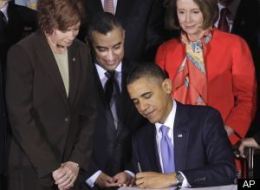
The government has asked U.S. federal courts to uphold the Don’t Ask, Don’t Tell policy as of Friday, even though the Obama administration has concluded that laws targeting gay Americans are, presumably, unconstitutional.
Court documents state the request was made in an opening brief challenging a Southern California trial judge who in September ruled against the ‘Don’t Ask, Don’t Tell’ policy, calling it unconstitutional.
“This case is thus now in a different posture,” Assistant Attorney General Tony West said in a statement. “That statute is now undergoing a repeal process subject to a more recent law duly enacted by Congress and signed by the President.”
The government is investigating whether it was unconstitutional for Congress to leave DADT in effect while the Pentagon works toward its appeal.
Friday’s brief was submitted in wake of the case brought by Log Cabin Republicans, a gay rights activist group that challenged DADT as a violation of First Amendment rights. U.S. District Judge Virginia Phillips agreed, and issued an injunction against DADT. The appeals court issued an order shortly thereafter that prevented Phillips’ rule from taking effect.
“Congress’s judgment on matters respecting military affairs is entitled to judicial deference, and, as this court noted in granting a stay pending appeal, an immediate court-ordered end to the policy would cause substantial disruption,” West said.
Gay rights activists eagerly await new developments in the case. The LGBT community supported the Department of Justice when it announced Wednesday they will refuse to uphold the Defense of Marriage Act (DOMA).
DOMA is a federal law introduced in 1996 that prohibits marital recognition between same-sex couples.
West did not reference the DOJ’s position on DOMA, but rather suggested that laws involving the military fall into a different category from those affecting civilians.











